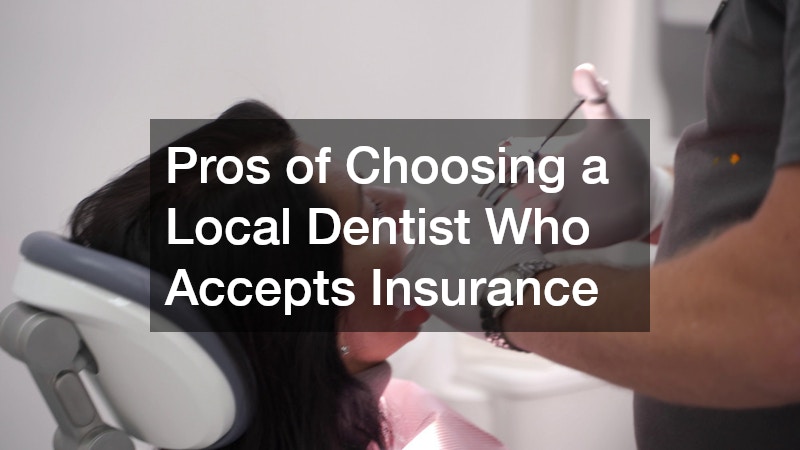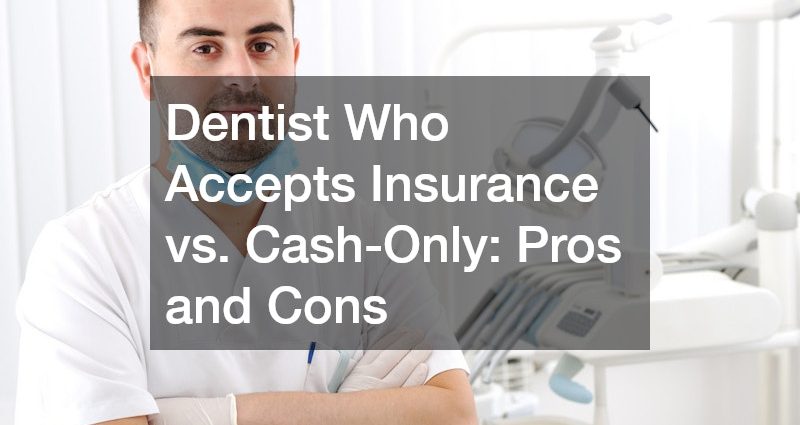
- A local dentist who accepts insurance offers cost-effective options and routine preventive care with minimal out-of-pocket expenses.
- Cash-only dental practices provide flexibility, transparent pricing, and personalized services, but require full payment upfront.
- Insurance-based care is ideal for those with coverage and families seeking consistent preventive services.
- Cash-only care works well for uninsured individuals or those pursuing cosmetic or specialized treatments.
- Always evaluate provider credentials, billing transparency, and service scope before making a choice.
Choosing a dental provider involves more than just location or reputation—it often comes down to how you plan to pay. One of the most important considerations is whether to go with a local dentist who accepts insurance or opt for a cash-only dental practice. According to the American Dental Association, nearly 50% of Americans delay dental care due to cost concerns. Understanding the financial dynamics of insurance-based versus cash-only dental care can empower patients to make more informed, cost-effective decisions.
A local dentist who accepts insurance can help offset expensive procedures and streamline billing. However, cash-only practices may offer lower prices and more transparent fees. In this article, we’ll explore the advantages and drawbacks of both models so you can choose what works best for your oral health and budget.
Understanding Dental Insurance: What Patients Need to Know

Dental insurance is designed to help offset the cost of routine and unexpected dental care. However, coverage limitations and provider restrictions can confuse patients.
Key components of dental insurance include:
- Premiums: Monthly payments to maintain coverage
- Deductibles: The amount you must pay before insurance begins covering expenses
- Copayments: A fixed cost paid by the patient per service
- Annual Maximums: The total amount an insurance plan will pay in a given year
Most plans fall under categories like PPO (Preferred Provider Organization), HMO (Health Maintenance Organization), or indemnity plans. These determine how patients access care, and whether they need referrals or can see any dentist.
Being in-network with a dental insurance provider means that a dentist has agreed to accept negotiated rates, which can lead to lower costs for patients.
What Does It Mean to Visit a Local Dentist Who Accepts Insurance?
A local dentist who accepts insurance enters into agreements with dental insurance companies to provide care at reduced rates. This arrangement allows patients to access dental services without paying full price out of pocket.
Benefits include:
- Direct billing: The dentist’s office handles the claims process
- Predictable costs: Based on the negotiated fee schedules
- Preventive care: Routine cleanings and checkups may be fully covered
Patients who choose an in-network local dentist who accepts insurance typically see:
- Easier cost planning with fewer surprise bills
- Lower costs for common procedures such as fillings, cleanings, and extractions
- Access to services that align with their dental plan benefits
However, limitations may apply based on your provider’s network or policy rules.
What Is a Cash-Only Dental Practice?
A cash-only dental practice does not accept insurance and requires payment at the time of service. These dentists typically operate outside insurance networks and adopt a fee-for-service model.
Characteristics of cash-only practices:
- Immediate payment required for all services
- No third-party billing or reimbursements
- May offer discounts or flexible financing plans
This model allows dentists to bypass insurance restrictions and administrative costs, which can improve treatment flexibility and time with each patient. While some patients appreciate the transparency, others may find the out-of-pocket burden too steep.
Pros of Choosing a Local Dentist Who Accepts Insurance

Working with a dentist who accepts insurance offers financial and logistical advantages, particularly for patients with active coverage.
Detailed Benefits:
- Lower Out-of-Pocket Costs: Insurance often covers 80–100% of preventive care and a portion of other services.
- Convenient Billing: Offices file claims directly, sparing patients the paperwork.
- Regular Preventive Care: Encourages biannual checkups due to low or no cost.
- Wide Network Access: Many insurance plans have a list of in-network local dentists who accept insurance within your area.
- Better Budget Management: Copays and annual maximums help control spending.
Summary of Pros:
- Reduced costs on common procedures like X-rays and fillings
- Insurance-friendly practices often help maximize benefits
- Access to a large provider network
- Clear communication of coverage and out-of-pocket expectations
- Often preferred by families and those with multiple dependents
Cons of Choosing a Dentist Who Accepts Insurance
While insurance can be helpful, it also comes with some limitations.
Detailed Disadvantages:
- Restricted Treatment Options: Some services may not be covered.
- Insurance-Driven Care Plans: Dentists may tailor recommendations based on reimbursement limits.
- Potential Delays: Pre-authorizations or insurer review processes can slow care.
- Annual Coverage Caps: After hitting the maximum, further services are fully out-of-pocket.
- Quality vs. Quantity: High patient loads due to low insurer reimbursement can affect personalized care.
Summary of Cons:
- May not cover cosmetic or advanced procedures
- Limited control over material choices or treatment timelines
- Potential billing disputes or denied claims
- Not ideal for those seeking specialized or boutique care
Pros of Choosing a Cash-Only Dentist
Opting for a cash-only dental provider can offer more personalized and flexible service.
Detailed Benefits:
- More Treatment Options: No limitations based on insurer rules
- Transparent Pricing: Upfront cost disclosures without hidden fees
- Quicker Scheduling: No delays for approvals or authorizations
- Customized Treatment Plans: Greater flexibility in using high-quality materials or alternative methods
- Higher Focus on Care Quality: Fewer patients per day allows more time per visit
Summary of Pros:
- Ideal for patients seeking control over their care
- Better for procedures not typically covered (e.g., veneers, whitening)
- Often includes flexible payment plans or memberships
- Personalized consultations without insurer influence
Cons of Choosing a Cash-Only Dentist
Though flexible, cash-only practices can be financially challenging for many patients.
Detailed Disadvantages:
- Higher Out-of-Pocket Costs: No insurance offsets for services
- Financial Burden: Particularly hard on families or patients needing extensive care
- No Insurance Reimbursement: Patients cannot submit claims for later compensation
- Fewer Accessibility Options: May be limited in rural or underserved areas
Summary of Cons:
- Cost-prohibitive for routine and emergency dental care
- No coverage for preventive visits unless paid fully out-of-pocket
- May require upfront deposits for advanced treatments
- Risk of delaying needed care due to financial pressure
Cost Comparison: Insurance vs. Cash-Only
Understanding real-world pricing can further highlight the differences.
Sample Procedure Costs:
| Procedure | With Insurance (in-network) | Cash-Only Practice |
| Cleaning (adult) | $0–$50 | $90–$150 |
| Filling (one surface) | $25–$100 | $150–$300 |
| Crown | $300–$800 (after coverage) | $1,000–$1,500 |
| Root Canal | $300–$600 | $800–$1,200 |
Patients using a local dentist who accepts insurance may benefit from significantly reduced rates for both routine and emergency care. Cash-only patients must plan for higher costs but may receive additional value through premium services.
Who Should Choose Which?
Best for Insurance-Based Dental Care:
- Individuals and families with active dental insurance
- Patients with regular preventive needs
- People with children or dependent adults
- Those who prefer predictable billing and budgeting
Best for Cash-Only Practices:
- Uninsured individuals
- Patients seeking cosmetic or holistic dentistry
- Those needing more direct access to advanced treatment
- People wanting fully customized dental plans
Tips for Choosing the Right Local Dentist
When evaluating providers, consider the following:
- Verify Network Participation: Use your insurer’s directory to find a local dentist who accepts insurance.
- Ask for Cost Breakdowns: Request written treatment estimates.
- Inquire About Payment Plans: Especially for cash-only offices.
- Assess Office Transparency: Are policies and billing practices clear?
- Evaluate Communication Style: Is the provider willing to discuss pros, cons, and alternatives?
Conclusion
Choosing between a local dentist who accepts insurance and one who operates on a cash-only basis requires weighing affordability, convenience, and care quality. While insurance-based dental practices are ideal for those with coverage and routine needs, cash-only practices may provide more personalized, flexible care for those without coverage or seeking advanced treatment options.
The right choice depends on your insurance status, budget, treatment goals, and personal preferences. Always research providers thoroughly and ask the right questions before committing to a dental care plan.
External Resources for Further Reading:
- American Dental Association – Dental Insurance Explained
- Healthcare.gov – Understanding Dental Coverage
- Consumer Reports – When to Skip Dental Insurance

